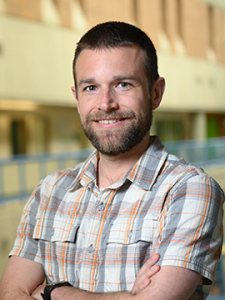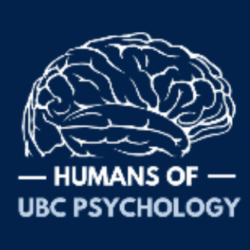By Aazadeh Raja and Maheep Chawla

I am a John Meyer enthusiast. He’s an American environmentalist. I worked as a tour guide at his house for many years and I had read more literature about him than any of the park rangers who worked at the house so they would come to me with questions about John Meyer.
Pronouns: He/him
Hometown: Lombard, Illinois
Favourite activity in Vancouver: Hiking, especially mountains!
Favourite trail: Mount Burwell
Why Psychology
I’ve always been interested in psychology. I took a few sociology classes during my first year of undergraduate studies and it was actually through those courses that I realized I was interested in taking the perspective of the individual as kind of the unit of analysis and understanding how people develop psychological dysfunction as well as what the techniques are by which we can improve their functioning and help them feel better about life or their future. I initially thought I was going to become a counselling psychologist although now I am more of an experimental psychologist with research interests in the social and cognitive field.
Academic Interests beyond Psychology
In my casual studies, I do a lot of reading on both the history of and contemporary foreign relations. I try to understand foreign policy and what drives it and then I bring that information back to the history of psychology within that realm. The question I explore is “what ways do different nation states use or build psychological interventions within their states to either help support their states or to deploy, usually as weapons, against other states?”
Foreign Relations has been an interest for me since my undergraduate days. The Iraq War took place right when I was starting my undergraduate studies, making it a central event by which I try to understand the larger world. Over the years, the impact of the war on me naturally evolved into reading books and journal articles about those topics and writing more. Currently I take casual classes from other universities that offer courses in international relations, diplomacy and related fields.
While I don’t try to tell students what they should believe in, I do want them to question “Is [foreign relations] a place where a psychologist should have a role in or should it be considered something that doesn’t fit in the conception or the social role that we afford psychologists?”
Other than that, I’m going to be taking a forestry class at UBC during the fall that I’m quite excited about. I’ve always had a lot of interest in the management of natural resources. Part of this was an interest driven by my own personal excitement of being in wilderness settings, and partly through my studies related to John Meyer. I’ve never had any formal training in forestry or resource management though which is why I’m excited to learn what the professional side of what this looks like.
Main Goals
I don’t have any main driving goals but I will say that I often have interests at any given point in time that I put a lot of effort into. These are very flexible and of course change as I move through life. One thing that I’m interested in right now is becoming better as a curler as well as building my endurance for long distance hiking and climbing. In addition to those, one goal that I have pursued throughout my lifetime is constantly trying to further my knowledge and learn more. Even after getting my undergraduate degree, I have always been enrolled in undergraduate and postgraduate coursework either through places like Coursera or by auditing courses at universities. I love learning new things.
Greatest Inspiration
The person I look up to the most is the psychologist Noam Chomsky. I find he is very eclectic in his knowledge and seems to have read just about everything ranging from human psychology, especially linguistics and language processing to foreign relations. These are all the topics I am interested in and he is everything I aspire to be. To be a living repository of all this information sounds incredible.
Unwinding after a hectic day: Nature and Reading
My favorite thing to do on a regular basis is going for a walk at the Pacific Spirit Park. I really love the forest. I’ll often take my little dog Harry with me!
I also love reading to relax after a hectic day. My favourite book is The Illusion of Conscious Will by Daniel Wegner. This book got me interested in studying experimental psychology. It’s about Wagner’s history of research with investigating our feelings about intention, consciousness and free-will. The book talks about all of the ways that our mind gives us the feeling that we have free-will and how that feeling of willfulness is a very important determinant of our actions. I am currently reading A Question of Torture by Alfred McCoy. The book discusses the transition of torture techniques from physical to psychological.
Advice for Students
For students feeling intimidated to approach their professors after class for questions/additional help:
First of all, I would say I was intimidated to reach out to professors when I was an undergraduate student. The thing I wish I would have known at that time is that even if you make a fool of yourself by asking a silly question, your professors aren’t going to care! They are just looking out for you and they want to help you learn. They aren’t going to judge you for your curiosity. Your question is 1 among 1000s. We have an egocentric bias which makes us think our impression matters more than it actually does. There’s really nothing that is lost by asking a silly question and there’s everything to gain by asking that question!
Career advice for students on finding work:
Start thinking about what you want to do after undergraduate studies as early as possible and try to make contact with people who are working in the field you are interested in. Look up the organization you are interested in working with and email someone working in the department you want to be a part of. The worst that will happen is they’ll delete your email. Again, there is nothing to lose! If you get a response, ask questions such as “how would I build a resume that would be attractive to employers in this area?”, “What are the skills that I can be working on right now that are going to make me a suitable candidate for this position?” among others relevant to your curiosity.
